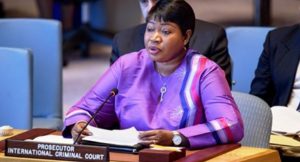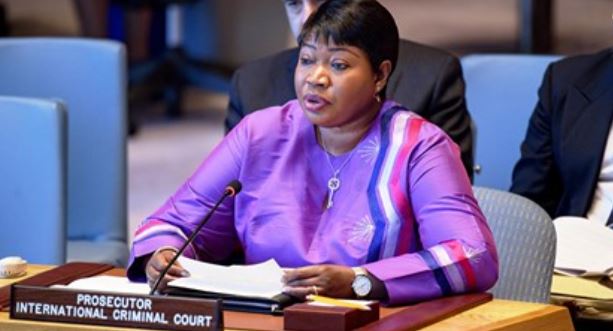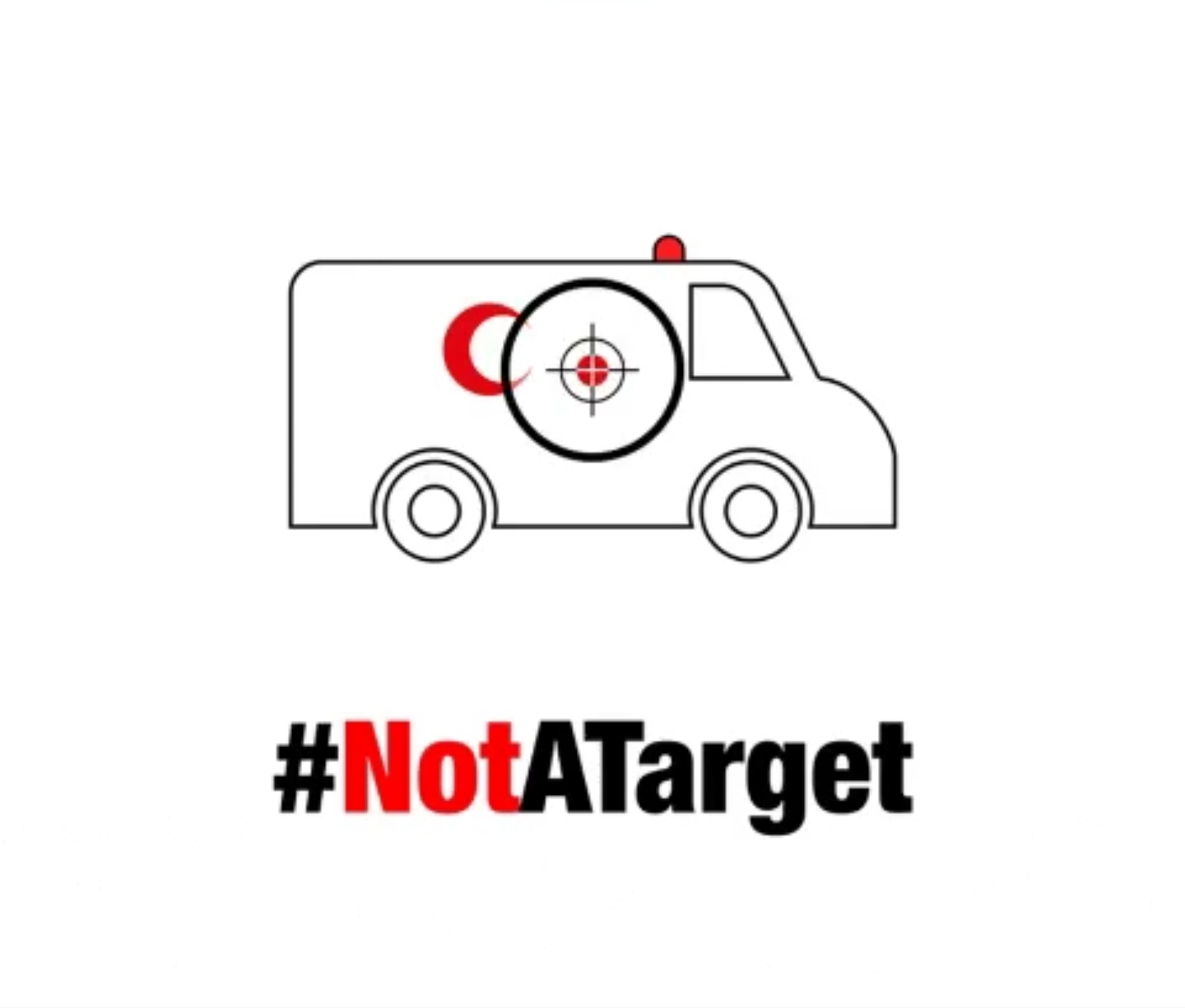By Sami Zaptia.

London, 9 May 2019:
In her statement yesterday to the United Nations Security Council on the situation in Libya (pursuant to UNSCR 1970 (2011), International Criminal Court (ICC) Prosecutor Fatou Bensouda said that she continues to make Libya a priority and to take the Libyan situation seriously.
She said that Saif Al-Islam Qaddafi, as well as other Libyans, were still wanted by the ICC and called upon the Libyan state as well as other states to cooperate with her.
Here is her full statement:
Mr President, Your Excellencies,
1. I welcome the opportunity to engage with this Council once again as I present my seventeenth report on the situation in Libya. Before I do so, allow me to congratulate Indonesia on assuming the presidency of this Council for the month of May, and to thank you for chairing this session.
2. As I address you today, to my great regret, the fighting in Libya continues unabated. Over the past six months, violence has escalated and armed clashes have occurred in several areas of Libya, including Derna in the east, Murzuq in the south, and Tripoli in the west. As always, my Office continues to closely monitor the ongoing conflict, gathering information from diverse sources and assessing whether crimes within the jurisdiction of the International Criminal Court may have been committed.
3. My Office is of course paying close attention to the ongoing armed conflict in and around Tripoli since early April this year. Reports indicate that the fighting has already cost 432 lives, including at least 23 civilians. More than 50,000 people have reportedly been internally displaced by the hostilities, while others remain trapped in conflict-affected areas. In addition, there are serious concerns for the safety of migrants and refugees who are detained in centres near areas of conflict.
4. On the 16th of April, I issued a statement calling on all parties to the armed conflict to fully respect the rules of international humanitarian law. I emphasised that all parties to the armed conflict must take all necessary measures to protect civilians and civilian infrastructure, including schools, hospitals and detention centres.
5. In particular, I urged commanders, whether military or civilian, to ensure that their subordinates do not commit Rome Statute crimes. The law on this is clear. Where a commander knew, or should have known, that their subordinates were committing or about to commit crimes, and failed to take all necessary and reasonable measures within his or her power to prevent or repress such crimes, the commander may be held criminally responsible.
6. I benefit from my intervention in this forum to once again make my message to all those involved in the fighting in Libya clear: my Office stands ready to investigate and, where appropriate, to prosecute any persons party to the ongoing armed conflict should they engage in conduct constituting a crime within the jurisdiction of the ICC. The suffering of the Libyan people must stop.
7. I urge this Council and all member states of the United Nations to ensure a consistent and unambiguous message is conveyed to all warring factions in Libya that the rules of international humanitarian law must be fully respected, and that perpetrators of atrocity crimes will be held individually criminally responsible.
Mr President, Your Excellencies,
8. I would now like to update the Council in relation to the case of Saif Al-Islam Gaddafi. As you are aware, in June last year, Mr Gaddafi filed a challenge to the admissibility of his case before the ICC. Mr Gaddafi submitted that his case was inadmissible because he had already been tried in Libya for the same conduct as alleged before the ICC.
9. Mr Gaddafi has lost this challenge. On the 5th of April this year, the majority of Pre-Trial Chamber I judges rejected his admissibility challenge, deciding that Mr Gaddafi’s case remains admissible before the ICC. Earlier today, a separate concurring opinion was issued by Judge Perrin de Brichambaut of the same Chamber where he concurred with the majority decision on three main points: first, that Mr Gaddafi has standing to lodge the admissibility challenge; second, rejecting the admissibility challenge, and third that the case against Mr Gaddafi is admissible.
10. In reaching its decision, the Chamber found that Mr Gaddafi had not been tried in Libya within the meaning of the relevant articles of the Rome Statute. According to Libyan national law, since Mr Gaddafi was convicted by the Tripoli Court of Assize in absentia, once he is arrested, his trial should start anew. Thus, no final judgment on the merits had been issued in the domestic proceedings against Mr Gaddafi. In addition, the judgment passed against Mr Gaddafi had not acquired a res judicata effect, which the Chamber found was required to satisfy the applicable articles of the Rome Statute.
11. Furthermore, the Chamber found that Mr Gaddafi had not received an amnesty in Libya. The Chamber observed that “granting amnesties and pardons for serious acts such as murder constituting crimes against humanity is incompatible with internationally recognized human rights.” It stated that “[a]mnesties and pardons intervene with States’ positive obligations to investigate, prosecute and punish perpetrators of core crimes” and “deny victims the right to truth, access to justice, and to request reparations where appropriate.”
12. These are important findings in relation to the fight against impunity for international crimes, and ones that align with previous findings concerning amnesties and pardons by several regional and international courts and tribunals around the world.
13. Mr Gaddafi has filed an appeal against the Chamber’s decision on the admissibility challenge.
Mr President, Your Excellencies,
14. Irrespective of the current admissibility proceedings, Libya remains under an obligation to arrest and surrender Mr Gaddafi to the ICC. Unfortunately, Mr Gaddafi’s case is not the only one in the Libya situation that remains at an impasse. Arrest warrants are also outstanding in relation to all other suspects in the Libya situation with respect to Messrs Al-Tuhamy Mohamed Khaled and Mahmoud Mustafa Busayf Al-Werfalli.
15. Ultimately, the execution of these arrest warrants depends on the cooperation of States. Regrettably, securing State cooperation in the arrest and surrender of suspects remains one of the greatest challenges faced by the ICC. The Court’s performance cannot be divorced from this reality. The Court’s success largely depends on the effective and concrete cooperation of states.
16. Failure to arrest and surrender persons against whom warrants of arrest have been issued can result in real harm. This is starkly illustrated by the case of Mr Al-Werfalli. Despite the ICC warrant of arrest against him for the war crime of murder in relation to 33 people, Mr Al-Werfalli remains at liberty and allegedly murdered another 10 victims just five months after the ICC arrest warrant was issued. Today, two warrants for his arrest remain outstanding. The fact that Mr Al-Werfalli is in Libya is well-known. He is not detained and there is no evidence that he has been genuinely prosecuted in Libya by his superiors in the Libyan National Army.
17. Mr Al-Tuhamy, former head of the Libyan Internal Security Agency, who is accused of crimes relating to the unlawful imprisonment, persecution and torture of perceived political opponents of the Muammar Gaddafi regime, has been wanted since 2013.
18. Notwithstanding the grave crimes alleged against them, all three suspects in the Libya situation remain at large. The failure to arrest these suspects jeopardises the Office’s ongoing investigations. It sends a message to victims that alleged perpetrators can evade justice and continue to commit crimes with impunity. It deters witnesses from coming forward and putting their confidence in the ICC, and places them in unnecessary danger. In the long run, this lack of accountability undermines respect for the rule of law and impedes progress towards stability and security in Libya.
19. The status quo is not sustainable. Impunity for atrocity crimes is hardly conducive to bringing peace and stability to this war-torn country. I take this opportunity to renew my call for state cooperation with the arrest and transfer of ICC suspects, and ask this Council to lend its support by taking a clear and vocal position in support.
Mr President, Your Excellencies,
20. My Office also continues to follow the situation relating to internally displaced persons in Libya. Tens of thousands of persons reportedly remain internally displaced. Internally displaced persons, especially women and children, are among the most vulnerable populations. They suffer not only significant social and economic impacts, but are also exposed to acts of violence.
21. Migrants also represent a highly vulnerable population in Libya. Reports of serious and widespread crimes being committed against migrants have not diminished over the past six month period. My team continues to gather evidence in relation to these alleged crimes through both investigative and cooperation strategies. In doing so, we pay particular attention to the commission of sexual and gender-based crimes.
22. The body of evidence collected by my Office indicates that crimes including torture, unlawful imprisonment, rape and enslavement are committed against migrants throughout their journeys and in both official and unofficial detention centres. The evidence implicates individuals, militias and State actors in the migrant smuggling and trafficking business in many parts of Libya, including Misrata, Al-Zawiyah, Tripoli and Bani Walid.
23. On the basis of the evidence collected to date, my team continues to assess the feasibility of bringing cases before the ICC in relation to crimes against migrants. At the same time, my Office is cooperating with a number of States and organisations to support national investigations and prosecutions that relate to human smuggling and trafficking through Libya. This strategy is aimed at closing the impunity gap by assisting national systems to provide accountability for crimes that may not fall within the ICC’s jurisdiction. Feedback from our partners shows that this strategy is already proving effective and issuing in concrete results.
Mr President, Your Excellencies,
24. Before I conclude, I would like to express my appreciation for the cooperation my Office receives from many States, including Libya, Tunisia, The Netherlands, Italy, and the United Kingdom. We also receive valuable assistance from organisations such as the United Nations Support Mission in Libya and INTERPOL. The practical support of these States and organisations for the work of the ICC deserves recognition.
25. I would also like to acknowledge the courage of many Libyans who have cooperated with my Office since 2011 until the present day. My team has spoken to people who have endured unspeakable suffering and lost loved ones in terrible circumstances. We are aware that, given the prevailing climate of impunity in Libya, there are people who see the ICC as their only hope to hold alleged perpetrators of atrocity crimes to account. We also know that many people, understandably, would like to see more results from the ICC, sooner rather than later.
26. The types of investigations undertaken by my Office are complex and often lengthy. However, I assure you, and the Libyan people, that the Libya situation remains a priority for my Office. My team takes most seriously its responsibility to investigate and prosecute ICC crimes in Libya, and is working hard to advance its existing cases and also to bring new ones.
27. Ultimately, my Office’s progress in the Libya situation is frustrated, and confidence in the ICC is undermined when, year after year, warrants of arrest remain unexecuted. The credibility of this Council is also tarnished if it fails to take concrete measures to secure the arrest and surrender of suspects. When suspects are arrested and surrendered to the ICC, the allegations against them can be tested in a fair and public hearing. This gives the victims of their alleged crimes the opportunity to participate in the proceedings, to be heard, and to see justice done.
28. Therefore, it is imperative that all of the outstanding warrants of arrest in the Libya situation are executed. The achievement of this goal requires the full cooperation of members of this Council and all concerned States. This includes both States Parties and non-States Parties, including Libya itself. Together, we can ensure the effective implementation of Resolution 1970 and adequately respond to the hopes and expectations it generated for the Libyan people. The peace and stability that the Libyan people have desired for so long are closely intertwined with the ICC’s ability to effectively execute its mandate in the Libya situation.
29. In a country devastated by war and conflict, with great human suffering, it is past time for the protective embrace of the law to feel real and tangible to Libyans. Mr President, Your Excellencies, acting within our respective mandates, we share a joint burden and great responsibility in this regard for the sake of all Libyans and Libya. We must not fail to deliver on that joint duty.
30. I thank you for your attention.








